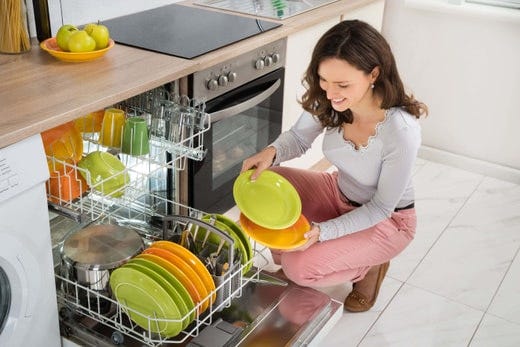Avoiding Common Mistakes With Dishwasher Powder: Dos and Don’t
Dishwasher powder is the essential component for your dishwasher, and for all the right reasons: it's pocket-friendly, easy to use, and ensures sparkling clean, efficient, and effortless dishwashing all at once.
However, we should avoid some mistakes with dishwasher powder to gain optimal dishwashing experience.
Every step counts in the quest for perfectly clean dishes using dishwasher powder. Each action is crucial, from selecting the best dishwashing powder to utilizing it optimally.
To avoid some of the most common mistakes we often make with our dishwashing powder, we have compiled a list of some absolute do's and don'ts.
Explore them and discover the secrets to achieving cleaner and shinier dishes!
Dos of dishwasher powder
Save yourself from dishwashing disasters; follow these dos religiously;
1. Choose the right dishwasher powder
The first step to start your journey with dishwasher powder is choosing the powder that guarantees the finest quality dishwashing cleaning and shines.
Opt for Finish dishwasher powder, whose deep cleaning power leaves no residue and removes tough stains, courtesy of non-ionic surfactants, oxygen-based bleaching agents, and enzymes (subtilisin, amylase).
2. Read the instructions
Carefully read the dishwasher powder packaging instructions to avoid the most common dishwasher mistakes. Each brand may have specific guidelines and recommendations for optimal usage.
3. Measure accurately
Follow the recommended measurements for your dishwasher powder based on the load type and size. Using too little or too much powder can drastically affect the dishwasher's cleaning performance.
4. Store properly
Store your dishwasher powder in a cool, dry place away from heat, moisture, and direct sunlight. This helps to maintain its effectiveness and prevent clumping.
5. Pre-scrape dishes
Before loading your dishes, remove large food particles or excess residue by scraping them off. This prevents clogging the dishwasher filter and ensures better cleaning results with your dishwasher powder.
Learn everything about clog prevention and unclogging to ensure your appliance runs at its optimal performance.
6. Load properly
Achieving optimal cleaning and drying results in your dishwasher starts with correct loading techniques. Place dishes in the designated racks when loading them, leaving enough space between each item. This allows proper water circulation and thorough cleaning.
Moreover, ensure that the dishes face the center of the dishwasher. This positioning helps the water spray reach all surfaces, ensuring effective cleaning and efficient drying.
7. Use rinse aid
For an ideal dishwashing experience, consider using one of the best rinse aid with dishwasher powder to prevent water spots on your dishes, ensuring a brilliant shine on your glasses and dishes. By lowering the surface tension of water, rinse aid effectively rinses residue, speeds up drying, fights water spots, and offers film protection.
8. Consider water hardness
Hard water causes limescale buildup in the dishwasher due to the excess calcium and magnesium minerals. Use dishwasher salt to counteract hard water effects by softening the hard water. As a result, the softened water allows the dishwasher detergent to dissolve more efficiently, leading to shinier, cleaner, and free-from-water spots dishes.
Don'ts of dishwasher powder
Let’s look at some of the most common mistakes with dishwasher powder to avoid:
1. Overloading the dishwasher
Avoid overloading a dishwasher as it prevents dishes from getting fully cleaned due to inadequate water and detergent circulation. In addition, overloading your dishwasher may cause you to rinse the same dishes twice, resulting in additional wear on the unit.
3. Using excessive amounts of dishwasher powder
Using more dishwasher powder than necessary does not guarantee cleaner dishes. In addition, using too much powder can leave residue on dishes and unnecessarily waste dishwasher detergent.
4. Neglecting dishwasher maintenance
Failure to clean your dishwasher with an effective dishwasher cleaner can result in maintenance problems like clogs, dirty filters, limescale accumulation, unpleasant odors, reduced cleaning effectiveness, and unhygienic dishwasher conditions.
5. Not heating the water enough
Ensure the temperature of the water in the dishwasher is hot enough to dissolve the dishwasher powder completely. An average dishwasher temperature runs its main cycle at about 51-60°C.
During the rinse phase, the water is heated to 80°C to ensure the dishes are safe to eat. Find out everything about your dishwasher water’s temperature with Finish’s dishwashing temperature guidelines.
6. Using dishwasher powder in the wrong compartment
Follow your dishwasher's specific instructions for loading the detergent powder. Placing it in the wrong compartment or dispenser may result in ineffective cleaning, improper detergent dissolution, and potentially damage your dishwasher.
Final thoughts
By adhering to the above dos and don'ts of dishwasher powder, you can maximize the cleaning power of your dishwasher powder and achieve cleaner, shinier, and hygienic dishwashing cleaning results.
Avoid the mistakes we shared with you and to get the best dishwashing experience, we recommend you to use our best ever dishwasher detergent “FInish Quantum Ultimate" to get the ultimate clean and shine with zero residue and watermarks.
FAQs
Why is my dishwashing powder not dissolving?
Possible reasons for dishwashing powder not dissolving include low water temperature or clogged holes in the spray arm, preventing enough water from being released into the tub.
What happens if you use too much dishwasher powder?
Using too much dishwasher powder can lead to excessive sudsing, poor rinsing, and residue on dishes. It can also cause issues with the dishwasher's performance, such as clogging filters or damaging sensitive components.
How do I make sure my powder detergent dissolves?
To ensure proper dissolution of powder detergent, ensure the water temperature is hot enough. The ideal temperature at which the dishwasher runs its cycle is somewhere between 50 and 60 ℃.
How much dishwashing powder do I put in my dishwasher?
The detergent quantity needed for most dishwasher models typically ranges from 2 teaspoons to 3 tablespoons. However, this requirement is subject to variations based on multiple factors, including the soil level on your dishes, the hardness of your water, and the detergent you choose to use.
.png?width=70&height=45&format=png&quality=50)
